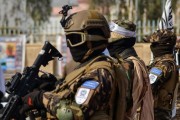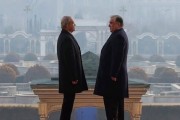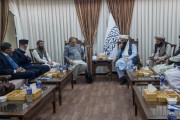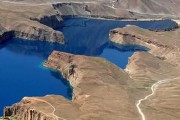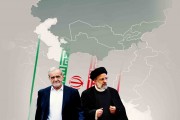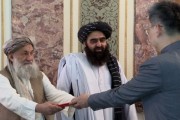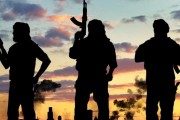Publish Date
Monday 13 September 2021 - 13:55
recommended
0
Why did Kabul fall and what is the future of Afghanistan?
If the Taliban had taken over Kabul after a heavy war, they would now have been overwhelmed with excitement, but it did not happen. The Taliban suddenly found themselves in a situation that they were not politically prepared for it. The Taliban are now drowning in a political shock, and not only the Afghan people but also the Taliban themselves are confused and frightened. All the Taliban are trying to do now is to control the public order. The developments of the last two months have been vague and rapid. However, the efforts of the Taliban’s political leaders to share the power among themselves as well as to hold meetings with Afghanistan’s former political leaders in Kabul are still going on. The overall outlook ahead of Afghanistan may be the formation of an authoritarian government, an economic collapse and the country’s return to the beginning point.
By:Abdulrahim Kamel
Introduction
Regarding the fall of Kabul, I think that it was a political fall and can never be considered a military fall. The reason for this claim is that the country's political leadership did not provide an opportunity for war with the Taliban at all. Therefore, no one can evaluate the level of army’s resistance or defeat.
The author's viewpoint is that the nature of Afghanistan’s conflict is political. Factors such as religion, economics and cultural issues are not the main elements of the conflict, but they are being used in line with the goals of the conflict.
In this article, we intend to address the reasons behind the fall of Kabul as well as Afghanistan’s vague future via this approach.
The reasons behind the fall of Kabul
1. Psychological factors
In political developments, both internally and externally, it is more the unique psychological characteristics of the leaders that will mark the end or beginning of a crisis, rather than macro political policies. The psychological characteristics of the fugitive President Ashraf Ghani played a very decisive role in the collapse of Afghanistan’s political system.
Ashraf Ghani believed that he knew everything better than anyone. He was an arrogant and opinionated man. He was used to spend all his time over reviewing important and unimportant documents as well as writing law and note. At the cabinet meetings, he also was used to declare his own word as the final decision. He was a headstrong ruler. Unlike Hamid Karzai's era, no literate person was honored during Ashraf Ghani’s term and no remarkable figure emerged.
He did not trust any official institution. He created a parallel structure for each ministry. These parallel structures were accountable only to Ashraf Ghani and were carrying out the decisions of the presidential palace without informing the minister or the head of the organization. Over the past years, he even dissolved several ministries and then re-established them under different names in order to be able to oust some ministers and create his own desired institutions. The number of governmental commissions and organizations was increasing day by day and the ministries were weakening. The provincial governors only had the authority to remove and install the eighth job position, which included the drivers and chefs.
After two elections, Ghani did not consider the nominated ministers of the political teams as his own confidants and practically humiliated them. During these years, he run many ministries via acting ministers. In the last two years, the Ministry of National Defense did not have a minister or even an acting minister!
These two psychological factors as well as the behavior of Ashraf Ghani weakened the foundation of the political system and finally this house of cards was destroyed by a hurricane.
2. Defective political structure
The Afghan constitution has defined the structure of the government in a way that effectively provided the ground for monopoly and centralization.
Ashraf Ghani practically restricted everything to himself as well as two of his companions. This monopoly was the most dangerous factor in the war which finally leads to fall of the government. According to the constitution, the president was the commander-in-chief and the sole decision-maker in declaring war and ceasefire. Even in the most remote part of the country, a military commander had no right to give a fire command in an emergency situation without permission of Ashraf Ghani. Sometimes the order was issued a day or two days later that the conflict was over and the team had been martyred.
3. Weakening the political leaders and removal of former commanders
During his term, Ashraf Ghani, instead of fighting the Taliban, practically confronted former political leaders and Mujahidin via spending a lot of time and money. After the successive fall of districts, the Afghan society witnessed a public excitement for national mobilization and public uprising. Ashraf Ghani and his team even practically blocked the public uprisings and destroyed the people’s motivation for national mobilization. The reason for this decision was that Ashraf Ghani did not want the opposition parties to be armed again in the form of public uprisings.
In addition to weakening political leaders, Ashraf Ghani removed almost all former commanders from the structure of the country's security institutions, and in the last five years, no experienced or high-spirited commander was remained in the country's combat forces.
4. Immigrant agents (officials)
In the structure of various branches of the presidency, ministries, departments and provinces, there were a lot of leaders and managers who were enjoying from exorbitant financial privileges and most of them had homes in foreign countries. In other words, the government of Afghanistan acted as an NGO after 2001, and even civil and human rights activities were essentially considered as financial projects.
Following the fall of districts and provinces, all the mentioned agents sent their families out of the country and their passports were already ready. Meanwhile, the low-ranking employees and soldiers of the country were present and saw the situation with their own eyes. It is wrong to ask the soldiers to stay in the battle filed while the leaders' passports are ready to go.
5. Lack of leadership and strategy
In general, we can say that Ashraf Ghani was not the one who could motivate the nation to defend the republic. The leader must be the embodiment of a collective ideal. Ashraf Ghani was never the embodiment of the republic. He did not have a clear strategy for war and peace. If he had resigned sooner, further developments would never have taken place.
6. Alignment of the U.S. and regional countries with the Taliban
Since two years ago, the United States and a number of countries in the region effectively strengthened the Taliban, gave them political legitimacy, and purged them. The people of Afghanistan will remember this historical memory for generations. The poor Afghans are the victims of regional and world powers rivalries. There is no need to talk about this. Everything is clear.
The future outlook and solution
1. Vague outlook
If the Taliban had taken over Afghanistan after a heavy war, it would now have been overwhelmed with excitement, but it did not happen. Contrary to the Taliban's expectations, they suddenly found themselves in a situation that they were not politically prepared for it. The Taliban are now drowning in a political shock. It seems that they have never thought about being in such a situation, hence, they have no plan for the administrative and political management of the country. That's why they have nothing to say now. They just refer everything to the Islamic rules and give general answers to all questions.
There is currently no clear political perspective. Both the Afghan people and the Taliban are are confused. All the Taliban is trying to do now is to control the public order. The developments of the last two months have been so vague and rapid that no analyst can predict Afghanistan’s political future. However, the efforts of the Taliban’s political leaders to share the power among themselves as well as to hold meetings with Afghanistan’s former political leaders in Kabul are still going on. The overall outlook ahead of Afghanistan is formation of an authoritarian government, an economic collapse and the country’s return to the beginning point.
2. Solution
It was initially stated that the nature of the ongoing conflict in Afghanistan is political. Therefore, without a comprehensive political strategy, this conflict will never be resolved, but will remain dormant for a while. So, any group, even if it occupies and dominates Kabul, will eventually disintegrate like the previous governments, if it does not have a comprehensive political plan for resolving the conflict. The core of Afghanistan's political conflict is the issue of power distribution. If the Taliban do not have a comprehensive plan for power distribution, the fate of the Bonne 2001 will be repeated once again in Afghanistan. At that time, the Taliban was deprived of having a share in power, and now this is the opposition of the Taliban that are deprived of power and the scenario will continue in reverse. Only the actors and the roles change and the scene is the same.
Therefore, the Taliban and their supporters must use their past experiences and distribute the political power technically and comprehensively. Then, they must devise a comprehensive plan to implement it and complete the peace-building phase. Peace-building does not happen even after initial distribution of power, because it needs a long-term operational plan for implementation and building sustainable peace.
Introduction
Regarding the fall of Kabul, I think that it was a political fall and can never be considered a military fall. The reason for this claim is that the country's political leadership did not provide an opportunity for war with the Taliban at all. Therefore, no one can evaluate the level of army’s resistance or defeat.
The author's viewpoint is that the nature of Afghanistan’s conflict is political. Factors such as religion, economics and cultural issues are not the main elements of the conflict, but they are being used in line with the goals of the conflict.
In this article, we intend to address the reasons behind the fall of Kabul as well as Afghanistan’s vague future via this approach.
The reasons behind the fall of Kabul
1. Psychological factors
In political developments, both internally and externally, it is more the unique psychological characteristics of the leaders that will mark the end or beginning of a crisis, rather than macro political policies. The psychological characteristics of the fugitive President Ashraf Ghani played a very decisive role in the collapse of Afghanistan’s political system.
Ashraf Ghani believed that he knew everything better than anyone. He was an arrogant and opinionated man. He was used to spend all his time over reviewing important and unimportant documents as well as writing law and note. At the cabinet meetings, he also was used to declare his own word as the final decision. He was a headstrong ruler. Unlike Hamid Karzai's era, no literate person was honored during Ashraf Ghani’s term and no remarkable figure emerged.
He did not trust any official institution. He created a parallel structure for each ministry. These parallel structures were accountable only to Ashraf Ghani and were carrying out the decisions of the presidential palace without informing the minister or the head of the organization. Over the past years, he even dissolved several ministries and then re-established them under different names in order to be able to oust some ministers and create his own desired institutions. The number of governmental commissions and organizations was increasing day by day and the ministries were weakening. The provincial governors only had the authority to remove and install the eighth job position, which included the drivers and chefs.
After two elections, Ghani did not consider the nominated ministers of the political teams as his own confidants and practically humiliated them. During these years, he run many ministries via acting ministers. In the last two years, the Ministry of National Defense did not have a minister or even an acting minister!
These two psychological factors as well as the behavior of Ashraf Ghani weakened the foundation of the political system and finally this house of cards was destroyed by a hurricane.
2. Defective political structure
The Afghan constitution has defined the structure of the government in a way that effectively provided the ground for monopoly and centralization.
Ashraf Ghani practically restricted everything to himself as well as two of his companions. This monopoly was the most dangerous factor in the war which finally leads to fall of the government. According to the constitution, the president was the commander-in-chief and the sole decision-maker in declaring war and ceasefire. Even in the most remote part of the country, a military commander had no right to give a fire command in an emergency situation without permission of Ashraf Ghani. Sometimes the order was issued a day or two days later that the conflict was over and the team had been martyred.
3. Weakening the political leaders and removal of former commanders
During his term, Ashraf Ghani, instead of fighting the Taliban, practically confronted former political leaders and Mujahidin via spending a lot of time and money. After the successive fall of districts, the Afghan society witnessed a public excitement for national mobilization and public uprising. Ashraf Ghani and his team even practically blocked the public uprisings and destroyed the people’s motivation for national mobilization. The reason for this decision was that Ashraf Ghani did not want the opposition parties to be armed again in the form of public uprisings.
In addition to weakening political leaders, Ashraf Ghani removed almost all former commanders from the structure of the country's security institutions, and in the last five years, no experienced or high-spirited commander was remained in the country's combat forces.
4. Immigrant agents (officials)
In the structure of various branches of the presidency, ministries, departments and provinces, there were a lot of leaders and managers who were enjoying from exorbitant financial privileges and most of them had homes in foreign countries. In other words, the government of Afghanistan acted as an NGO after 2001, and even civil and human rights activities were essentially considered as financial projects.
Following the fall of districts and provinces, all the mentioned agents sent their families out of the country and their passports were already ready. Meanwhile, the low-ranking employees and soldiers of the country were present and saw the situation with their own eyes. It is wrong to ask the soldiers to stay in the battle filed while the leaders' passports are ready to go.
5. Lack of leadership and strategy
In general, we can say that Ashraf Ghani was not the one who could motivate the nation to defend the republic. The leader must be the embodiment of a collective ideal. Ashraf Ghani was never the embodiment of the republic. He did not have a clear strategy for war and peace. If he had resigned sooner, further developments would never have taken place.
6. Alignment of the U.S. and regional countries with the Taliban
Since two years ago, the United States and a number of countries in the region effectively strengthened the Taliban, gave them political legitimacy, and purged them. The people of Afghanistan will remember this historical memory for generations. The poor Afghans are the victims of regional and world powers rivalries. There is no need to talk about this. Everything is clear.
The future outlook and solution
1. Vague outlook
If the Taliban had taken over Afghanistan after a heavy war, it would now have been overwhelmed with excitement, but it did not happen. Contrary to the Taliban's expectations, they suddenly found themselves in a situation that they were not politically prepared for it. The Taliban are now drowning in a political shock. It seems that they have never thought about being in such a situation, hence, they have no plan for the administrative and political management of the country. That's why they have nothing to say now. They just refer everything to the Islamic rules and give general answers to all questions.
There is currently no clear political perspective. Both the Afghan people and the Taliban are are confused. All the Taliban is trying to do now is to control the public order. The developments of the last two months have been so vague and rapid that no analyst can predict Afghanistan’s political future. However, the efforts of the Taliban’s political leaders to share the power among themselves as well as to hold meetings with Afghanistan’s former political leaders in Kabul are still going on. The overall outlook ahead of Afghanistan is formation of an authoritarian government, an economic collapse and the country’s return to the beginning point.
2. Solution
It was initially stated that the nature of the ongoing conflict in Afghanistan is political. Therefore, without a comprehensive political strategy, this conflict will never be resolved, but will remain dormant for a while. So, any group, even if it occupies and dominates Kabul, will eventually disintegrate like the previous governments, if it does not have a comprehensive political plan for resolving the conflict. The core of Afghanistan's political conflict is the issue of power distribution. If the Taliban do not have a comprehensive plan for power distribution, the fate of the Bonne 2001 will be repeated once again in Afghanistan. At that time, the Taliban was deprived of having a share in power, and now this is the opposition of the Taliban that are deprived of power and the scenario will continue in reverse. Only the actors and the roles change and the scene is the same.
Therefore, the Taliban and their supporters must use their past experiences and distribute the political power technically and comprehensively. Then, they must devise a comprehensive plan to implement it and complete the peace-building phase. Peace-building does not happen even after initial distribution of power, because it needs a long-term operational plan for implementation and building sustainable peace.
Abdul Rahim Kamel, is an Afghan analyst and writer
News code:2785





